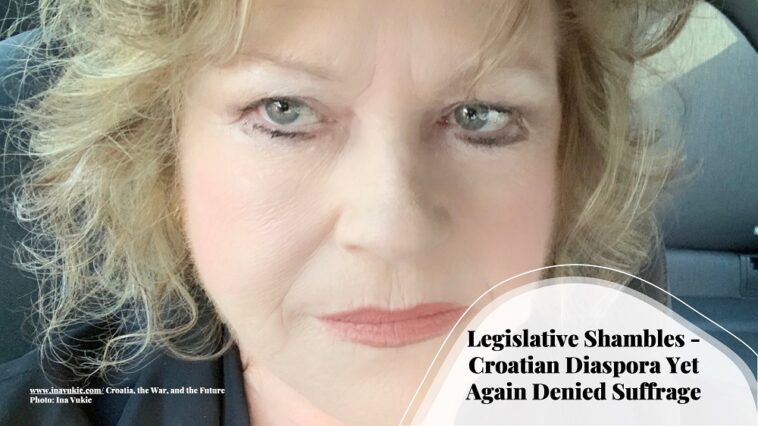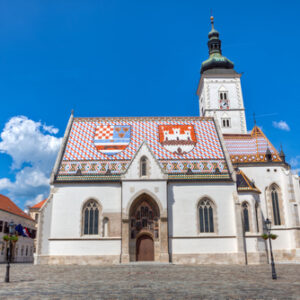You just can’t make stuff like this up!
In February 2023, the Constitutional Court of the Republic of Croatia repealed the Law on Electorates or Constituencies and ordered it invalid or expired as on 30 September 2023, and that on October 1 new law must be enacted by the Croatian Parliament and be in force. The Constitutional Court warned the legislator, i.e., the parliament, of the need to change the regulations governing parliamentary elections back in 2010, because some constituencies were already violating the legal requirement which stipulated that the number of voters should not deviate from the average by more than five percent. But politics did nothing.
On Thursday September 28, 2023, the Croatian Parliament passed a new law on electoral constituencies but as Shakespeare would say: “Something is rotten in the state of Denmark”.
Apparently, immediately after being passed in the parliament the new law was sent to the Office of the President of the Republic of Croatia for the required signature so that the law could become valid, become law by October 1, 2023, and in accordance with the Constitutional Court’s orders from February. The government was in a rush to secure that required signature as it only had less than three days to comply with the Constitutional Court orders. But President Zoran Milanovic did not sign the new law by 1 October, he signed it on October 3. To make matters worse and a total shamble HDZ (Croatian Democratic Union) government had published the new law in the Government Gazette Narodne Novine as law four days after the deadline for it to be valid as enacted law!The new law was, therefore, not law when the government published it in the Gazette and, therefore, it now seems that the new law will have to be returned to the parliament for a new procedure to enact it etc. This shamble meant that there was a legal vacuum between 1 and 3 October with no enacted law on Constituencies, and the one passed in parliament on 28 September could not be made valid retrospectively. The government is shamelessly fumbling around, blaming others for their incompetency, even to the point that no damage was done by this vacuum because there were no elections afoot! Anything to save its face and avoid responsibility for not doing its job, which was making sure that the law was passed in parliament with time left over for president to sign within the 8-day Constitutional rule!
You just can’t make stuff like this up! Unbelievable!
If by now you got the feeling that we are in some children’s playground here and not in real law-making surrounds, I don’t blame you. It’s either children’s play enveloped with long-standing tit-for-tat between the Prime Minister and the President, a blaming game playing between them that has no end or half-time pause, or it is pure corruption at play – and it is in the latter that Shakespeare’s famous phrase fits in so aptly. The government could have brought the new law for parliament’s vote sooner, not leaving about less than 3 days within which the president must sign! Under the Constitution and by law, the President must sign a new law within 8 days of it having been passed by the parliament and delivered to him for signature and, indeed, president Milanovic, albeit too late for the government’s hopes, did do that and commented that “he is not some scribe who will jump at every government’s beck and call in order to correct the political and procedural sloppiness of the ruling majority in the Croatian Parliament. As in this case, the President of the Republic will continue to take care only and exclusively of respecting the letter and spirit of the Constitution of the Republic of Croatia, regardless of the political and procedural attacks of the HDZ and its partners in the Croatian Parliament.”
Generally, the new law on electoral constituencies does not change the existing electoral system in Croatia, but to a certain extent changes the maps of the electoral districts, as a result of which around a fifth of voters (22 percent), change the constituency in which it is now. This is nothing we who live in developed democracies in the “West” are not familiar with; our electorate or constituency boundaries change every so often as dictated my law and as per requirement. The new law in Croatia was passed in the parliament by 77 Yes votes, all of which are HDZ ruling party plus its coalition minor parties, 56 against, from the opposition and 18 either abstained from voting or were not present in the parliament for voting. This essentially means that nobody from the parliamentary opposition crossed the floor to vote with the government.
Not a good sign at all for such an important piece of legislation.
The future members of Croatian Parliament (elections scheduled for 2024), 151 of them, will be elected by Croatian voters according to the existing model, in 10 constituencies with 14 representatives each within the territory of Croatia, eight representatives will be elected by members of national minorities in Croatia, and three by the Croatian diaspora, i.e., Croatian citizens without residence in Croatia.
The HDZ government claims that the new law respects the equal weight of the voter’s vote in each constituency, but the reality and truth are far removed from that.
Ten new constituencies within Croatia were determined in such a way that the number of voters is within the legal framework of +/- 5 percent, that is, in none of the units the deviations are greater than +/- 2.20 percent. The number of voters in each constituency was based on data from the voter register. The constituency for ethnic minorities and the one for the diaspora or eligible voters living outside Croatia were neither touched nor revisited in the drawing up of this new law. What a shame!
Equal rights in voting are denied to the Croatian citizens living abroad, to the diaspora, in several ways and repeatedly over the years. The most obvious way of denial of rights relates to the fact that all eligible voters living outside Croatia are placed in one constituency and, going by the eligible voter numbers published in February 2023 by the Constitutional Court, at the end of 2022 there were 948,032 eligible voters (Croatian citizens) living outside Croatia, and 3,655,057 eligible voters living within the territory of the Republic Croatia. The former having increased by significant numbers and the latter decreased since the end of 2019 due to large exodus or emigration of Croatians from Croatia in the past couple of years. Hence, about 365,505 voters live in each of the 10 constituencies in Croatia and 948,032 in the constituency comprising of voters living abroad! Seems the government needs a refresher course in basic mathematics!
No equality in votes there, despite what the government’s claim of equality!
Then, polling places in the diaspora constituency are restricted by law to be held only at the Croatian diplomatic-consular missions, which in effect means that, depending in which country outside Croatia an eligible voter lives, he/she is up for anything between 10 to 5,000 kilometres travel just to cast his/her vote, to which he/she is entitled or has suffrage under human rights conventions.
No equality in votes there, despite the government’s claims of equality!
Then, each constituency within the territory of Croatia can elect 14 representatives into the parliament and the constituency for diaspora, which is at least three times larger in eligible voter numbers, can only vote for three representatives (diaspora up until 2010 had 12 representatives in the Croatian Parliament but this was cut to three by no other than, you guessed it – former communist Yugoslavia operatives)! This is the diaspora that was crucial in creating and defending from brutal Serb aggression the independent state of Croatia during the 1990’s War of Independence!
No equality there, despite the government’s claim of equality!
It has been mentioned in some Croatian media during the past month that some members of the opposition recommended in parliament, at the time of submissions regarding this new law, that the diaspora be afforded postal and electronic voting. However, this among other proposals from the opposition quarters was rejected by the government, and then by the parliament as well. It’s been more than twenty years during which individuals and groups from the Croatian diaspora have unsuccessfully lobbied and worked to achieve their human right of the right to vote and equal suffrage. Ethnic minorities living in Croatia are entitled to eight seats in the Croatian parliament and each representative can secure a seat with only few dozen votes! The diaspora is much much larger and is entitled to only three seats!
The picture one gets from this is that of a mini-Yugoslavia held together by puppet threads within the Croatian Parliament and, as it is well known, communist Yugoslavia loathed the Croatian diaspora – because it was overwhelmingly against communism and fled from it into democracies of the” West”. The so-called democratic government and the parliament in Croatia is evidently filled with communist Yugoslavia sympathisers, if it were not the case then the diaspora would receive the recognition it deserves, the rights it is entitled to and Croatian democracy and economy would benefot enormously as a result.
While the largely leftist parliamentary opposition threatens to seek court’s ruling on the Constitutionality of this new law, as far as that move benefitting diaspora is concerned – I will not be holding my breath. Much of the opposition, SDP/Social Democratic Party that is, were the ones who in 2010 embarked upon further reduction of voting rights for Croatian citizens living in the diaspora (there had never been postal or electronic voting for diaspora). Croatian citizens, emigrants in Western and Northern Europe and overseas countries have been suffering constant degradation of their human and democratic right to vote for almost twenty years, which consequently results in lower and lower voter turnout. The representatives they currently have in the parliament all come from Bosnia and Herzegovina, undoubtedly chosen by the ruling party, and placed there via electoral engineering and fraud to ensure that Croats living in the diaspora do not get their voice in the parliament. Currently, even the names and identities of parliamentary representatives of the Croatian diaspora are overwhelmingly unknown throughout the diaspora and there are no dialogues transpiring between them!
A most unnatural and sinister situation for Croatians living in the diaspora, for which they took no part in creating.
Diaspora can fix this injustice. Diaspora can assert its voting right. The Croatian diaspora cannot sit complacently and do nothing. Elections are coming in 2024 and the diaspora should secure its voice and vote, if for nothing else then for the future generations. By participating in elections there is a much better chance in Croatia becoming a democracy it fought for during the War of Independence. In this the diaspora may sound like a broken record (with its incessant lobbying for change and complaints and criticisms over the decades) but, oh yes, the music it puts out is, without a doubt – the best. Keeping Croatian identity alive. Nurturing it! Ina Vukic




